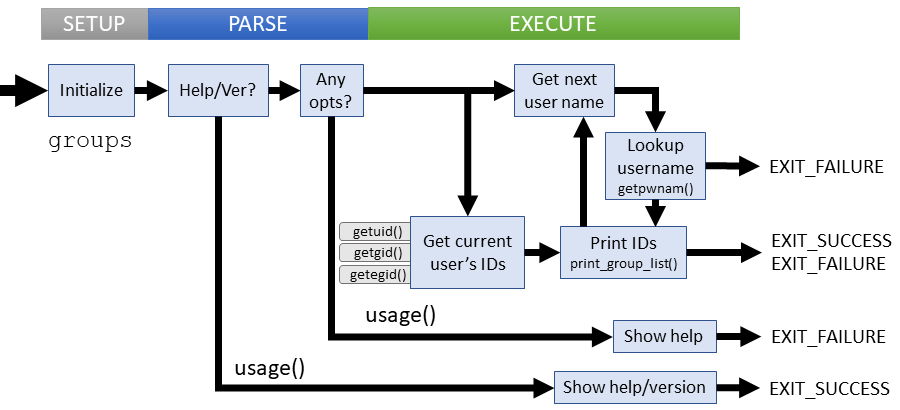[GNU Manual] [No POSIX requirement] [Linux man] [FreeBSD man]

Summary
groups - print group names a user is in
Lines of code: 146
Principal syscall: getuid(), getegid(), getgid(), getgroups() (via mgetgroups() in gnulib)
Support syscalls: None
Options: 2 (--help and --version)
Added to Coreutils in February 2008 [First version]
Number of revisions: 36 [Code Evolution]
None
External non-standard helpers:die()- Exit with mandatory non-zero error and message to stderrerror()- Outputs error message to standard error with possible process terminationprint_group_list()- Prints the distinct groups the user is in (in group-list.c)
Setup
main() introduces a few local variables:
egid- The effective gid currently being evaluatedok- The final return statusoptc- The character for the next option to processrgid- The real gid currently being evaluatedruid- The uid currently being evaluated
Parsing
Parsing groups is limited. There are only the default options (help/version) plus optional arguments representing the usernames to look up.
Using any option other than --help and --version is a parsing failure which results in a short error message followed by the usage instructions.
Execution
The primary job of the groups utility is to get the uid/gid of the input username and then pass it to an external function that does the real effort (print_group_list())
No username provided:
- Get the current user real UID using
getuid() - Get the current user effective GID using
getegid() - Get the current user real GID using
getgid() - Pass the IDs to
print_group_list()to print the information - Print new line character
Username(s) provided:
- Loop through each user name argument and:
- Look up the user in passwd using
getpwnam() - Pull the UID, EGID, and GID from the passwd entry
- Pass the IDs to
print_group_list()to print the information - Print new line character
- Look up the user in passwd using
Failure cases:
- Cannot get the UID, EGID, or GID.
- User not found in passwd
All failures at this stage output an error message to STDERR and return without displaying usage help